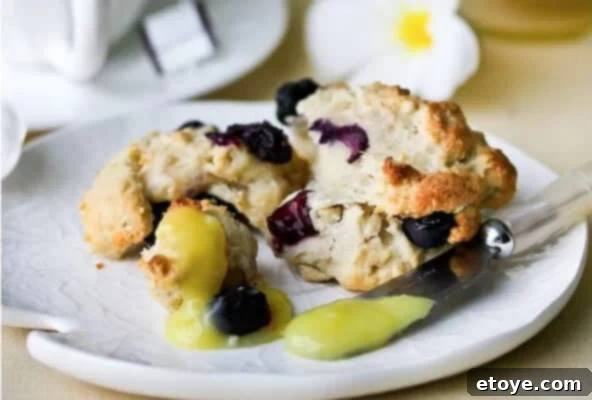
Experience the Ultimate Delight: Perfectly Moist Blueberry Scones with Zesty Lemon Glaze
There’s a universally acknowledged truth that few things compare to the comforting aroma and taste of freshly baked goods straight from the oven. Among these culinary treasures, scones often hold a special, yet sometimes misunderstood, place. For many years, my experience with scones was, to put it mildly, less than inspiring. I associated them with dry, dense, and disappointingly bland pastries that required an industrial-grade amount of tea or coffee to wash down. It was a perception deeply ingrained, one that I believed would never change – until I encountered a scone that truly redefined everything I thought I knew.
A Scone Revelation: From Skeptic to Enthusiast
My culinary journey took an unexpected turn one afternoon while I was teaching at a vibrant cooking school. Kathy, the school’s owner and a true culinary maestro, embodied warmth and an infectious passion for baking. I remember walking into the bustling kitchen, my arms laden with ingredients for an evening class, a usual scene in my busy schedule. As I methodically tucked items into the refrigerator, Kathy approached me, her eyes twinkling with that familiar baking day enthusiasm. In her hand, she held a blueberry scone, still warm and emanating an inviting aroma that subtly began to challenge my long-held prejudices.
My initial reaction was, honestly, to politely decline. The scones I knew were more akin to decorative doorstops than delightful treats. They were notoriously dry, lacking any discernible flavor, and possessed a texture so formidable you could practically use them for light construction work. The thought of adding another dense, rock-hard pastry to my list of culinary disappointments filled me with dread. I stood there, concocting a mental escape plan, wondering where I could discreetly deposit this unexpected offering without offending Kathy.
Just as I was contemplating the most subtle scone disappearance act, Kathy’s voice boomed across the studio kitchen, a joyous command more than a suggestion: “Try it! This blueberry scone is still warm from the oven!” Her infectious excitement made retreat impossible. Disposing of it, even covertly, would surely be noticed. A scone of such density would announce its arrival in the trash can with an undeniable thud. With a sigh of internal resignation and a large glass of water at the ready as my “chaser,” I reluctantly broke a piece off.

What happened next was nothing short of a culinary epiphany. The moment my fingers touched the scone, I felt an unexpected tenderness. It yielded softly, a far cry from the unyielding nature of its predecessors. Then came the first bite. The world seemed to slow down as a wave of unexpected pleasure washed over my palate. This wasn’t just a scone; it was a revelation. It was:
Soft. Moist. Warm. Delicate. A True Blueberry Scone.
The texture was rich, the crumb delicate, and the blueberries burst with a sweet-tart juiciness. It was, in a word, perfect. This experience shattered my long-held biases and opened my eyes to the incredible potential of a well-made scone. From that moment on, I became a true devotee, determined to recreate that magic in my own kitchen.
The Secrets to Achieving Perfectly Moist Scones Every Time
The profound difference between Kathy’s glorious blueberry scone and all the others I had encountered wasn’t just magic; it was the result of thoughtful technique and specific ingredients. I quickly learned that achieving such moist, rich, and delicate qualities has everything to do with how the dough is handled – or rather, how it’s *not* handled. The cardinal rule of scone making is to avoid overworking the dough. Over-mixing develops gluten, leading to a tough, rubbery texture that is the antithesis of a perfect scone.
This recipe emphasizes mixing by hand with a wooden spoon, a simple but crucial step that prevents the common pitfall of over-mixing. It allows you to gently combine the ingredients, ensuring the butter remains in small, distinct pieces, which is key to creating those signature flaky layers and a tender crumb. Those little pockets of butter melt during baking, releasing steam and creating airy pockets that contribute to the scone’s light texture. Beyond the technique, the choice of ingredients plays an equally vital role. Yes, a generous amount of good quality butter is non-negotiable, contributing richness and flavor. But the secret weapon in this recipe is undoubtedly the sour cream. Sour cream adds moisture and a subtle tang, tenderizing the dough and ensuring a supremely moist crumb that stays fresh longer. It’s the perfect counterpoint to the sweetness of the blueberries and the brightness of the lemon glaze.
Mastering Your Scone Dough: Tips for Success
- Cold Butter is Key: While the recipe calls for softened butter to make it easier to cut into the dry ingredients, ensure it’s not *too* soft or melted. Cold butter helps create those pockets of steam for a flaky texture. You can even cube it and chill it further before adding.
- Don’t Overmix: As mentioned, this is the golden rule. Mix just until the ingredients are combined. A shaggy, slightly lumpy dough is perfectly fine and desired.
- Gentle Folding: When incorporating the blueberries, fold them in gently to avoid crushing them and prevent the dough from turning blue or becoming tough.
- Uniform Scooping: Use an ice cream scoop or a measuring cup to portion out the dough. This ensures uniform size, which leads to even baking.
- Preheat Thoroughly: A hot oven helps the scones rise quickly and achieve a golden-brown exterior.
The Zesty Counterpart: Lemon Glaze (Definitely Not Curd!)
No truly exceptional scone is complete without an equally impressive accompaniment, and for these blueberry scones, our vibrant lemon glaze is the perfect partner. Now, for a quick confession: the original name for this luscious topping is, in fact, lemon curd. However, I must admit to an almost unnatural phobia to the word “curd.” It simply doesn’t sound appealing to me, evoking images far removed from the smooth, creamy, and delightful concoction it actually is. And trust me, if you try to feed my kids anything with the word “CURD” in it, there’s a 99% chance that they’ll fling it back in your face. So, to ensure maximum appeal and minimum culinary drama in my household, we’ll stick to calling it a “lemon glaze.”
This “lemon glaze” provides the perfect balance to the subtly sweet scones. Its bright, zesty notes cut through the richness of the butter and sour cream, creating a harmonious flavor profile that will have you reaching for another scone almost immediately. The glaze is designed to complement, not overpower, ensuring each bite is a delightful blend of sweet, tart, and fruity goodness. It adds a beautiful sheen and an irresistible tang that elevates the entire scone experience.
Crafting Your Lemon Glaze: Important Tips
- Fresh Lemon is Best: Always use fresh lemons for both zest and juice. The flavor is incomparable.
- Constant Whisking: Whisking continuously is crucial to prevent the eggs from curdling and to ensure a smooth, velvety texture.
- Avoid Boiling: Keep the heat on medium-low and never let the mixture come to a rolling boil. This is paramount for preventing the eggs from scrambling.
- Patience for Thickness: The glaze will thicken as it cooks. Don’t rush it. The low heat and steady whisking will achieve the desired consistency. It will also thicken further as it cools.
- Versatility: This lemon glaze isn’t just for scones! It makes a fantastic topping for pancakes, waffles, yogurt, or even as a filling for tarts. It also makes a wonderful homemade gift when canned in sterilized jars.
This particular recipe for blueberry scones is specifically crafted with very little sugar in the scone itself. This intentional decision ensures that the accompanying lemon glaze provides all the sweetness you need, creating a balanced and not-too-cloyingly-sweet treat. However, if you plan to enjoy these scones without any glaze or jam, feel free to increase the amount of granulated sugar in the scone dough to suit your preference. Either way, prepare for a scone experience that will forever change your perception of this classic baked good.
For a visual guide to making these delicious scones, Betty Crocker Test Kitchens even created a fantastic how-to video using this very recipe!
Blueberry Scones with Lemon Glaze Recipe
Yields 12 delightful blueberry scones
Ingredients for Blueberry Scones:
- 3 cups all-purpose flour
- 2 tablespoons baking powder
- 1/2 teaspoon salt
- 3 tablespoons granulated sugar (increase to 1/2 cup if skipping glaze)
- 1/2 cup (1 stick) unsalted butter, softened
- 2 cups light sour cream
- 1/4 teaspoon vanilla extract
- 1 cup fresh blueberries
Instructions for Blueberry Scones:
- Preheat your oven to 350°F (175°C). Prepare a cookie sheet by lightly greasing it or lining it with parchment paper.
- In a large mixing bowl, thoroughly whisk together all the dry ingredients: all-purpose flour, baking powder, salt, and granulated sugar.
- Add the softened butter to the dry ingredients. Using your fingertips, a pastry blender, or two knives, cut the butter into the flour mixture until it resembles coarse crumbs.
- In a separate small bowl, gently whisk together the sour cream and vanilla extract.
- Pour the sour cream mixture into the flour and butter mixture. Stir with a wooden spoon just until the ingredients are combined and a soft, shaggy dough forms. Be careful not to overwork the dough; a few dry spots are acceptable.
- Gently fold in the fresh blueberries. Distribute them evenly throughout the dough with minimal mixing to keep the scones light and delicate.
- Using a 1/2-cup scoop or by hand, portion the dough onto the lightly greased cookie sheet. Leave a little space between each scone.
- Bake for 30 minutes, or until the tops are beautifully golden brown and a toothpick inserted into the center comes out clean. Baking time may vary slightly depending on the size of your scones.
- Remove from oven and let cool slightly on a wire rack. Serve warm with the Lemon Glaze.
Zesty Lemon Glaze Recipe (formerly known as Lemon Curd!)
Ingredients for Lemon Glaze:
- 3 medium lemons (for zest and juice)
- 2 large eggs
- 1 cup granulated sugar
- 4 tablespoons (1/4 cup) unsalted butter, cut into 1-tablespoon pieces
Instructions for Lemon Glaze:
- Thoroughly wash the lemons. Using a microplane grater, zest all three lemons, collecting the zest in a medium saucepan.
- Cut each zested lemon in half and juice them directly into the saucepan with the zest. Aim for approximately 1/2 to 3/4 cup of fresh lemon juice.
- To the saucepan, add the eggs and granulated sugar. Whisk all ingredients together until well combined.
- Place the saucepan over medium heat. Whisk constantly, ensuring the mixture heats through evenly. It is crucial that the mixture does not come to a boil, as this will cause the eggs to curdle.
- Once the mixture is hot and begins to thicken slightly, reduce the heat to low.
- Add the butter, one tablespoon at a time, whisking continuously until each piece is fully incorporated and melted before adding the next.
- Continue cooking on low heat, whisking constantly for another 6 minutes, or until the lemon glaze has significantly thickened to a pourable but creamy consistency. It should coat the back of a spoon.
- Remove the saucepan from the heat and allow the lemon glaze to cool completely. As it cools, it will continue to thicken further.
- This versatile lemon glaze can be stored in an airtight container in the refrigerator for up to two weeks and also makes a fantastic, delightful gift when properly canned and sealed.
